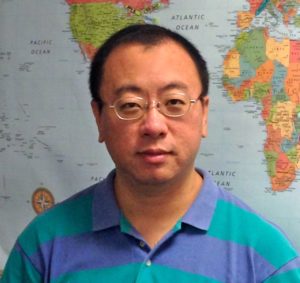Finding New Ways to Think About Healthcare

“Can you tell me how much this will be?” the tired single mom asks the pharmacist.
After mere seconds of hope, the mom deflates when she sees the larger-than-she-can-afford number staring back at her. She apologizes to the woman behind the counter, as she’s not able to pay for the prescription.
As she grabs the hands of her children and turns to leave empty handed, the pharmacist calls after her. “Wait! Have you heard about GoodRx?”
Maybe you’ve seen or heard this commercial before. If not, spoiler alert: It has a happy ending.
Whether it’s a prescription coupon app like GoodRx or an organization founded to pay off people’s medical debt, entrepreneurs of all kinds are finding new ways to think about healthcare.
This opportunity for large impact is one of the reasons Babson Associate Professor and research scholar Yunwei Gai is so passionate about health economics.
Making Sense of Actions and Decisions

Growing up in a small city in China, in a family of small business owners, Yunwei Gai “was interested in day-to-day operations and how policies impacted business,” he explains. This interest led him to choose economics as his major in college.
“Economics enables us to analyze the actions and decisions at both individual and government levels,” says Gai. “And, it helps us predict their outcomes and make necessary and better changes.”
But, economics wasn’t the only subject that caught his eye. He also was fascinated by medicine. Because some of his family members faced health issues during his high school and college years, Gai began to explore the world of healthcare. “I wanted to support them, so I learned more about it,” he recalls.
While attending graduate school at Florida State University, Gai realized he could combine his two passions. He says doing so is one of the best decisions he has ever made.
Impacting the Future of Healthcare
“[In healthcare], we need a new way of thinking … we need new strategies to help solve current issues,” says Gai. “The status quo won’t work.”
Which is why both economics and entrepreneurship come in handy.
“I study the relationships between policies, environmental factors, and individual health behavior and outcomes,” explains Gai, who enjoys using Big Data and his analytical skills to help people.
The intersection of economics and healthcare is heavily reflected in his work. Two of his recent pieces include: “Medicaid Expansion, HIV Testing, and HIV-related Risk Behaviors in the United States” co-authored with Babson Professor John Marthinsen, accepted by the American Journal of Public Health (AJPH) and “Does State-Mandated Reporting Work? The Case of Surgical Site Infection in CABG Patients,” accepted by Applied Economics.
Much of Gai’s research is related to healthcare costs, preventative care, and disparities in health and healthcare—all of which he believes are pressing issues in the healthcare sector. “This is research that can make an impact,” he adds. “It can help policymakers and businesses allocate their resources more effectively.”
Bringing Babson to the Real World
Gai has been a part of the Babson community for more than 10 years.
When asked what the most fulfilling part of his job is, he responds, “Hearing good news from my students. Whether it’s a promotion, continued schooling, a new job, or a great interview—I like knowing what they’ve learned in my class has helped them in the real world.”
According to Gai, his students already are working on projects to help patients and healthcare workers that “can make meaningful, large impacts on people’s lives.”
Posted in Insights





